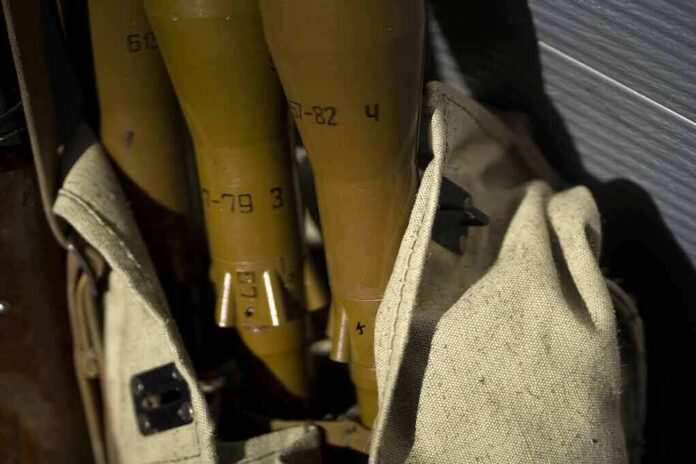
The Pentagon has abruptly halted crucial munitions shipments to Ukraine as America’s own stockpiles reach dangerously low levels, forcing President Trump to make tough choices between supporting foreign allies and maintaining U.S. military readiness.
Key Takeaways
- The Pentagon has paused shipments of critical munitions to Ukraine including Patriot air defense missiles and precision artillery rounds due to dwindling U.S. stockpiles.
- President Trump’s administration is prioritizing America’s military readiness and domestic interests over foreign commitments, especially with potential conflicts involving China and Iran.
- U.S. military assets are being redistributed to the Middle East following recent actions against Iranian nuclear facilities, creating vulnerabilities in other strategic regions.
- Ukraine was not informed about the weapons halt and is now scrambling to adjust its defense strategy against increasing Russian attacks.
- The Kremlin has welcomed the decision, suggesting it could hasten the end of the conflict in Russia’s favor.
America First: Pentagon Halts Critical Weapons to Ukraine
In a decisive shift that signals President Trump’s America First policy in action, the Pentagon has stopped shipping certain critical munitions to Ukraine. This major decision affects vital defense systems including Patriot air defense missiles, precision artillery rounds, and Hellfire missiles. The halt comes after a comprehensive review of U.S. weapons stockpiles revealed concerning shortages that could compromise America’s own military readiness. The pause reflects the administration’s clear prioritization of domestic security interests over foreign commitments, particularly as global tensions mount on multiple fronts.
“The decision was driven by the Pentagon’s policy chief, Elbridge Colby, after a review of munitions stockpiles raised concerns about the dwindling number of artillery rounds, air defense missiles, and precision munitions,” explained Elbridge Colby.
Middle East Tensions Strain Resources
President Trump’s decisive military actions against Iranian nuclear facilities have significantly altered America’s strategic posture in the Middle East. This shift has necessitated a substantial redistribution of military assets, creating observable gaps in other regions. For instance, a Patriot missile defense battalion was transferred from South Korea to the Middle East, while the USS Nimitz carrier group was repositioned to support operations. These movements, while strengthening America’s position against Iranian aggression, have placed additional strain on an already stretched U.S. defense industrial base that is attempting to fulfill simultaneous commitments in Ukraine, Israel, and across the Middle East.
“White House Deputy Press Secretary Anna Kelly stated that the decision was made to prioritize America’s interests following a Department of Defense review of military support to other countries,” Anna Kelly.
The situation is further complicated by potential ripple effects across global security dynamics. Instability in Iran could disrupt international energy markets, threatening China’s vital oil imports and potentially influencing Beijing’s calculations regarding Taiwan. American military success in containing Iranian nuclear ambitions may strengthen long-term Pacific deterrence capabilities, but it creates near-term vulnerabilities as resources are diverted from the Indo-Pacific theater where China continues to flex its growing military power.
Ukraine Left Scrambling
The decision to halt weapons shipments caught Ukrainian officials completely off guard. Having received over $100 billion in aid under the previous administration, including $43 billion in weaponry, Ukraine now faces an uncertain future as Russia increases its attacks. Ukrainian forces report a significant rise in missile and drone launches in recent weeks, with June seeing some of the most intense bombardments since the conflict began in February 2022. Without continued supplies of air defense systems and precision munitions, Ukraine’s ability to protect its cities and critical infrastructure is severely compromised.
“The Ukrainian side stressed that any delay or procrastination in supporting Ukraine’s defence capabilities would only encourage the aggressor to continue the war,” stated Ukraine’s foreign ministry.
Meanwhile, Moscow has welcomed the American decision, viewing it as advantageous to their military campaign. “The fewer the number of weapons that are delivered to Ukraine, the closer the end of the special military operation,” declared Kremlin spokesman Dmitry Peskov. This statement aligns with President Trump’s consistent position encouraging peace talks between Russia and Ukraine, suggesting a potential shift in U.S. strategy from indefinite military support to pushing for diplomatic resolution of the conflict that has claimed tens of thousands of lives and displaced millions since it began.
The Production Dilemma
One of the most pressing challenges facing the Trump administration is the limited production capacity for advanced munitions. Increasing production of sophisticated systems like Patriot interceptors will take considerable time, even with emergency funding and prioritization. The American defense industrial base, which was allowed to atrophy during peacetime, now struggles to meet the demands of multiple simultaneous conflicts. This production bottleneck affects not only America’s ability to support Ukraine but also its capacity to maintain adequate stockpiles for potential conflicts in the Taiwan Strait or Korean Peninsula.
“Tom Karako, a missile defense expert, emphasized that while air defense won’t win a war, its absence can lead to a swift defeat,” noted Tom Karako.
President Trump’s decision to reassess America’s commitments abroad demonstrates a pragmatic approach to national security that places U.S. interests and military readiness above foreign entanglements. As America faces increasing challenges from China, Iran, and Russia, ensuring that our own forces are adequately equipped becomes paramount. While Ukraine’s struggle against Russian aggression remains significant, the Trump administration’s calibrated approach recognizes that America must maintain its strategic deterrent capabilities across multiple theaters to effectively protect its citizens and vital national interests in an increasingly dangerous world.












